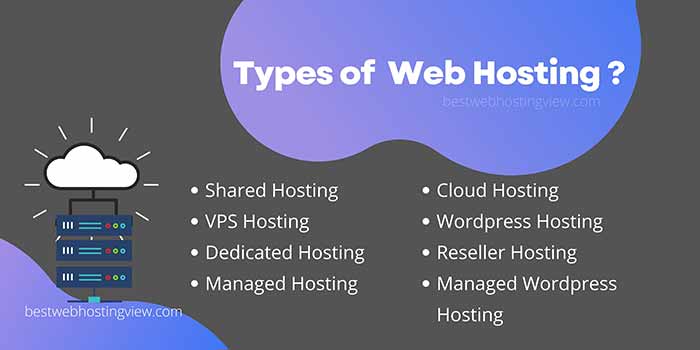What is Web Hosting? Must-Know Web Hosting Types Before you Buy 2025
Hello, are you in the process of starting your own website, but you’re unsure what web hosting is? and What is the hosting server? How does web hosting work? Are you aware of the various types of hosting? Throughout this article, we will try to provide simple and best answers to each of these questions.
Perhaps you have heard the term web hosting without really understanding what it means if you are thinking about starting your own website.
Knowing how to host your website is essential to making your presence online a success.
Irrespective of whether you want to develop your own website or have someone create one for you, you’ll need to understand what website hosting is.
A website cannot go live without web hosting. It is one of the essential services all websites need. We’ll explain exactly what is Web Hosting, and why it matters, to you so you can understand why it’s so important.

What is Web Hosting?
A website hosting service provides a way for millions of people to access your website on the Internet. Whether your site is small or large, it cannot be accessed on the internet without a web hosting service.
You can upload your website files onto the World Wide Web (Internet) by using a web hosting service. As a result, anyone with an internet connection can view your website.
It is necessary to host every website file on a server. Those files are stored in web hosting, which allows people on the Internet to access the content of your site.
The website hosting company provides the web space with various types of hosting, operates, and maintains the servers on which the websites are hosted. Every website that is online is hosted by a different web hosting company.
Your website is stored on their servers after you have purchased Web hosting and a unique DNS is associated with it. Your domain name server contains the address that allows your website to be accessed by people all over the world.
Do you Know How Web Hosting Works?
To understand what web hosting really means and how it works, we need a little background on how the Internet works.
When your computer sends out requests to different servers, these servers are called DNS servers.
These DNS servers act as the address book of the Internet where they translate the IP address into the domain name.
They give the data back based on the type of request that was sent through. If you want to access your favorite website, your computer automatically makes a request for their site using the information sent from your DNS server. Therefore, if you type www.bestwebhostingview.com into your browser, your computer first asks your DNS server whether that domain exists, and then gets redirected to the actual host page.
A web host must have access to your server hardware (hard drive) to load the operating system that runs your website. In addition, a web host must provide enough bandwidth to handle the amount of traffic your site receives over time. A web host may charge per gigabyte (GB), per month, or even per hour. Some hosts offer unlimited monthly bandwidth; others do not.
This whole process happens extremely fast but it’s just a basic explanation. Let me know if this helps!
What is Web Hosting Space or Web Hosting Server?
Hope you simply understood what is website hosting and how it works? You have to create numerous files, images, and HTML code to create a website when you run an online business.
Now just look at what is Web hosting Space?
Hosting companies provide space on a server where you can keep all your files, and are responsible for delivering your files, as soon as your domain name is typed into a browser.
Without online storage, your documents would only exist on your computer, where no one would ever see them.
In order for your website to be hosted on the internet, you must give it its own storage space on the server.
Servers are the computers that store those files. Therefore, servers are powerful computing devices that host websites and store data about them.
Using the servers, now your website can be accessed from anywhere on the internet you can access it anywhere in the world.
As a result, if you do not have a server, your website cannot be accessed from the internet.
To get on the server, your website needs to be hosted by a company that provides web hosting services.
Servers run continuously so that anyone who requests your website can view it at any time.
A hosting service costs money, but it’s actually just renting a web space to host your website.
What is Web hosting bandwidth?
Web host bandwidth refers to how much data can be transferred over the Internet. Bandwidth is measured in bits per second (bps) or kilobits per second (kbps). The more bandwidth you have, the better your connection speed is. Web hosts offer different types of bandwidth (shared or dedicated), depending on how much you want to pay.
What is a Web Hosting Company?
A web hosting company is an organization that provides space on its servers or network connections for websites to live on. It also offers customers the ability to create their own website.
A web host is a company that hosts your website on its server or Internet connection. They provide storage space, bandwidth, and other resources to store and serve your website. They usually charge a fee for the service they offer, usually a combination of a fixed price plus hourly usage charges.
There are several types of web hosting companies out there. Some specialize in high traffic sites, whereas others focus on low traffic. The cost of web hosting services varies widely depending on where you choose to host your site.
Web hosting companies that host websites own warehouses full of powerful servers where all the components required to run the websites they host are found.
The Webhosting company was also responsible for maintaining your website’s technology and services so that they could be accessed via the Internet.
When someone clicks on a link to your website or types the URL into their browser, those servers both serve as a storage space as well as a way for viewers to access those files.
Who is Web Hosting Service Providers?
Web Hosting Services are companies that provide space on their servers to other businesses. They offer this service to others at a cost. Most website owners buy web hosting services from a company called web hosting service providers.
Web hosting services enable websites to be created and hosted online. These companies own large data centers that store hundreds of thousands of computers connected together that can simultaneously access the internet.
Once a web host receives an order to create a website, they transfer the files containing your website over to their server. If you want to view your website, someone else’s computer needs to connect to the website’s IP address. Since these websites are stored all over the world, they need some type of connection to move information back and forth.
A web host provides storage space for the content of your website. You pay them monthly for the amount of space that you use. There are many different types of plans that range from cheap, shared hosts to expensive dedicated hosts.
How to Choose the Right Web Hosting Provider?
You should look into the following points when choosing where your website will be hosted.
All of those questions should be taken into consideration before you choose your web host.
After you have selected a hosting provider, registering your domain is as simple as pie! In most cases, registering your domain with the same hosting provider is recommended.
What is a Domain Name?
We should begin with a brief discussion of domain names before going into more detail.
A domain name was the first thing you purchased when you decided to start an online business. The domain name acts as your company’s online address.
Imagine this:
If you were renting space at a physical business location, you would provide customers with your address so they could locate you. The same way you give your domain name to customers when renting space on the internet.
The IP address of your domain is created whenever someone types your domain name. All the pictures, videos, and words that make up your website are retrieved from all the files associated with your IP address by your hosting service provider.
The domain name of each website is unique. It is impossible to duplicate a domain name. You can always choose a website name that perfectly represents your brand whenever you start a new website.
After reserving a domain name, you can begin creating your site.
4 Major points to consider Before you buy a web hosting plan.
1. Cost of Web Hosting
Cost is always going to play a role in your decision-making process before buying web hosting. When planning out how much money you want to spend when it comes to hosting your website, you’ll want to find a service that offers the lowest price possible.
Of course, if you’re a business owner who wants to make sure your site stays online 24/7, then your budget may be bigger than someone who is just starting out and doesn’t have big plans yet. Whatever your needs are though, you’ll want to buy web host around until you find a solution that fits them well.
2. Flexibility of Plans.
When it comes to your hosting plan, you may want to get what you think is the best deal, only to find out after a few weeks that you were paying too much. This is where having a flexible hosting plan comes into play. With a flexible hosting plan, you have the freedom to change the way your site operates at any time.
If you decide you’d rather start using WordPress instead of Joomla, or use a different CMS altogether, you won’t have to pay extra fees to switch over because your plan was already set up for these changes. On top of that, your hosting company may offer a free upgrade option so you can easily add additional resources or services without breaking the bank.
3. Reputation of your Web Hosting Provider.
It’s not just about saving money by getting the cheapest web hosting service. You also want to ensure that they offer the highest quality service. One thing that many people forget to look into when selecting their VPS hosting providers is the reputation and past performance of the organization.
While some web hosting providers have a good track record and history in the industry, others could quickly go from being great to terrible. When researching any type of hosting provider, check to see if they’ve received positive reviews from other users or clients. Also, if you see anything negative written about them, avoid signing up with them.
If something goes wrong with your site or your account, you’ll want to know that they will work hard to fix the issue and keep your content safe. As long as they give you a quick answer to your questions, they may have been around for quite a while, but you still shouldn’t assume they will be there forever.
4. Reliability & Support Services
You want your website hosted at a company that has been around for years. A reputable hosting provider will have excellent customer support, reliable performance, and strong uptime guarantees. You don’t want your site down because of a server failure or downtime! Good hosting providers often have 24/7 tech support available, and make sure their performance metrics are regularly monitored and reported.
Do you know how many types of hosting there are?

Nevertheless, when choosing a hosting company, it is important to pay attention to the types of hosting packages available. The following are the most common web hosting types that you will see.
Shared Hosting :
What is Shared Hosting?
With shared hosting, multiple sites share the same server space with hundreds or even thousands of others. As a result, the host is able to offer web hosting services at a very low price.
For new sites and small sites with little traffic, shared hosting tends to be the most affordable and easiest type of hosting.
There are also disadvantages to shared hosting.
It is possible for other websites to slow down or even crash if one site experiences a surge in traffic that puts additional strain on the server.
Sharing hosting is problematic because of the numerous other sites on the host’s server, which may represent unknown security risks. Because all sites housed on one server share the same resources, it is possible for their neighbors to infect your site with viruses or malware.
Shared hosting is ideal for Students, individuals, startups and small businesses.
If you feel your website needs more resources, upgrade to a more powerful hosting plan.
Best Shared Hosting Deals 2025
VPS Hosting.
What is VPS Hosting?
VPS stands for Virtual Private Server.
It is an intermediate type of hosting between shared and dedicated hosting, which is different than traditional shared hosting.
Virtual partitioning allows users to separate their VPS hosting accounts from other sites, even if they share the same space as shared hosting, which gives them more control over how their sites are set up.
The VPS is a more sophisticated, stronger version of shared hosting. Despite sharing a server with other websites, your website is equipped with resources that are not shared with those of other websites.
Almost all Virtual Private Servers feature SSD storage from top to bottom.
The plan you choose will ensure that you always receive the set amount of CPU, STORAGE, RAM, and bandwidth, regardless of what other users are doing on the server. The partition distinguishes your projects from those of other users.
It’s more expensive to host a website with a VPS, but it gives you the flexibility and the space your site needs as it evolves and attracts more visitors.
It does not affect the performance of your website if traffic surges on other sites
With virtual private servers, users can manage their websites more easily without competing with each other for server resources and have more control over resources.
You should choose a VPS if you struggle to afford a dedicated server.
Medium-sized businesses with growing traffic and websites may find VPS hosting to be a great solution.
Best VPS Hosting Deals 2025
75 % OFF

- 2 core CPU
- 2GB RAM
- 40 GB SSD
- 10 Tb bandwidth
17% OFF

- 2 core CPU
- 2GB RAM
- 40 GB SSD
- 1000 GB bandwidth
Dedicated Web Hosting.
What is Dedicated Hosting?
Dedicated hosting refers to a web host that has fully committed resources to your website. They offer exclusive features to ensure your site performs consistently at peak levels. This ensures that you are getting top-tier service. A dedicated server is one that is specifically designated to a single Client or organization.
If you opt for a dedicated hosting package, your host will manage the physical needs of your server, such as space, security and power.
With dedicated hosting, you get full access to your server’s root file system and full control over it. however, installing software, configuring the site architecture, and maintaining it is all up to the client.
With a dedicated server, you won’t have to worry about security or performance issues like you would with shared hosting.
The functionality can also be substantially enhanced, but this will increase management and maintenance expenses.
Dedicated servers are typically rented monthly and provide a client with a certain amount of RAM, disk space, and bandwidth.
Although dedicated hosting can be expensive, it provides complete control for large and complex sites that have a high volume of traffic or collect sensitive information. Dedicated hosting works well for eCommerce websites with high traffic volumes. If you have a blog or a large site, you can benefit from this type of hosting.
The benefits of renting a dedicated server are virtually the same as owning an on-site server, but the hosting company will provide professional support for your site.
Dedicated hosting is best for larger and more traffic-intensive websites.
Best Dedicated Hosting Deals 2025
25% OFF

- 4 cores CPU @3.9 GHz
- 16 GB RAM
- 2 * 240GB SSD
- 5 Tb bandwidth
52% OFF

- 6 core CPU
- 480 GB SSD
- 16 GB RAM
- Unmetered bandwidth
21% OFF

- 4 core CPU @3.4 GHz
- 8GB RAM
- 480 GB SSD
- 100 TB/m bandwidth
Managed Hosting
What is Managed Hosting?
A dedicated server is available to you, but administrative options are limited. In managed hosting, your provider will handle security and maintenance, while you manage content via FTP (File Transfer Protocol).
The use of managed hosting, which provides expert installation and ongoing maintenance, can be a financially viable and hassle-free approach to online business, particularly for those who do not want to manage their websites themselves.
An arrangement like this lets the host manage all updates, security patches, and other technical issues related to the website, leaving you free to concentrate on running your business and creating content.
In comparison to shared hosting packages, managed-to-host features significantly more site setup services and customer service, at a comparable price to the more expensive shared-hosting packages.
Some managed hosting providers also offer WordPress hosting.
Businesses with extensive websites requiring more maintenance and support may find managed hosting solutions an attractive option.
Cloud Hosting
What is Cloud Hosting?
A cloud-hosted website makes use of cloud resources. Instead of being hosted on one server, cloud solutions use a number of servers. Cloud servers ensure greater flexibility and scalability because they are connected virtual and physical servers.
Using Cloud Hosting, your host provides you with a network of servers that copies your files and resources. In the event that one cloud server is too busy or is experiencing problems, traffic is immediately diverted to another cloud server. There is a very low chance of downtime with this technique, which is best for sites with high traffic.
Using a cloud computing service means that users can scale based on their needs; they only pay for services they consume and no unused capacity is charged. Since users only pay for the services they consume, the cost of cloud hosting is relatively low.
Using cloud hosting services is one of the most advanced forms of web hosting today. They are scalable, flexible, and reliable. Businesses of all sizes are now turning to cloud hosting services for better results.
WordPress Hosting
What is WordPress Hosting?
A WordPress hosting service is simply hosting a website that has been optimized for WordPress performance.
You can use WordPress hosting to host and manage your website using the WordPress software. A CMS such as WordPress enables you to design and manage a website without knowing a single line of code.
Currently, WordPress is the world’s most popular content management system(CMS).
If you’re going to build your website with WordPress, you’ll have to select a WordPress hosting plan. WordPress hosting allows you to publish and manage your website using WordPress.
WordPress is specially configured on your server and essential plugins are installed for critical functions, including caching and security.
You could perhaps buy Shared, Managed, VPS, or Dedicated hosting individually and then install WordPress CMS on that hosting to create a WordPress website.
You can create a website or blog using WordPress is the easiest way and best economical option for beginners and Business Websites.
You should consider purchasing a WordPress hosting package if your website or blog is built on WordPress. WordPress hosting packages are specifically designed for WordPress websites.
Best WordPress Hosting Deals 2025
30% OFF

- 1 Site
- 15 GB SSD
- 2 Tb bandwidth
Reseller Hosting
What is Reseller Hosting?
A Reseller Hosting account allows you to resell the same hosting services offered by the parent hosting company if you want to get into the hosting business.
The reseller hosting plan also allows you to upsell all the other web services provided by the parent hosting company.
You can make equal packages of RAM, CPU, SSD storage, and bandwidth once you purchase reseller hosting from the hosting provider.
Using white label systems, you can lease them to your clients under your brand name so that you can expand your business and establish your brand.
Best Reseller Hosting Deals 2025
List of Web Hosting Providers 2025.
These are the most popular hosting companies offering their current promotions. Their websites include information about new discounts and deals.
 IONOS IONOS | $ 0.05/m | > Check Latest Deal |
 Dreamhost Dreamhost | $ 1.99/m | > Check Latest Deal |
 Namecheap Namecheap | $ 1.88/m | > Check Latest Deal |
 Hostinger Hostinger | $ 1.99/m | > Check Latest Deal |
 Hostarmada Hostarmada | $ 2.99/m | > Check Latest Deal |
 Hostmonster Hosting Hostmonster Hosting | $ 4.95/m | > Check Latest Deal |
 Justhost Hosting Justhost Hosting | $ 3.95/m | > Check Latest Deal |
 Flywheel Hosting Flywheel Hosting | $ 13.00/m | > Check Latest deal |
 Kinsta Hosting Kinsta Hosting | $ 5.95/m | > Check Latest deal |
 Accuweb hosting Accuweb hosting | $ 5.49/m | > Check Latest deal |
 LiquidWeb Hosting LiquidWeb Hosting | $ 9.50/m | > Check Latest deal |
| $ 24.99/m | > Check latest Deal | |
 Nexcess Hosting Nexcess Hosting | $ 13.30/m | > Check Latest Deal |
Conclusion
Why do I Need Web Hosting?
You may already know that this is how the internet works, but if you don’t, allow me to explain. When people visit your website, they aren’t just seeing your personal blog. They are actually viewing a page on a website hosted somewhere out on the world wide web.
People who view your website are calling up the address of your server, asking for a webpage.
If they can’t find what they are looking for, they’ll leave and go look at someone else’s page instead. In order to get people to come to your website, you need to make sure you are storing the correct information on the right server.
How Do I Choose A Web Hosting Provider?
The first thing to do before choosing your host is to research what they have to offer.
When planning out some basic information about them, make sure that you know what their plans are like, how many servers they can handle, and if they have a 24/7 live chat feature.
You should also look at their uptime record. If they don’t offer a 99.9% uptime guarantee then you should move somewhere else.
Also take note of any customer service issues that may arise. Don’t forget to check out what kind of speed they provide. Is it dedicated hosting or shared? Some hosts will give you a certain amount of bandwidth per month but others will charge you by GB used.
Lastly, you want to make sure that you get a reliable provider.
How much does web hosting cost?
Web Hosting comes at a cost that ranges anywhere between $1-$500 per month depending on the hosting type of service you choose. There are also other hidden fees that can add up.
The cost of web hosting can vary depending on what type of plan you opt for. Most companies offer both Shared Hosting and Virtual Private Servers (VPS). If your site is only going to have low traffic, shared hosting may just work fine for you. Shared Hosting costs will start from $0.50 per month.
However, if you are expecting a lot of visitors, then get into VPS hosting. This way you’ll avoid the downtime and performance issues that come along with shared hosting. VPS Hosting costs start from $3.50 per month. Another thing to keep in mind is that prices will increase as your site grows.
What happens if something goes wrong with your website?
As much as we’d like to believe that everything will go smoothly, eventually something bad will happen. If your hosting provider cannot fix the problem fast enough, it could result in lost visitors, revenue, and even legal trouble. Read the terms of service carefully, and make sure you know what your provider’s policies are regarding downtime and data loss.
If you cancel hosting, what happens to your domain?
Your Domain Name Itself Stays Registered
Think of it this way: your domain name (www.example.com) is like your website’s address. Your hosting is like the land where your website “lives.” Cancelling hosting means you’re getting rid of the land, not cancelling the address.
The domain registration is separate from the hosting service. Each is billed separately, even if they are bundled, and canceling one does not automatically cancel the other. Your domain remains registered to you until its expiration date.
What Does Happen When You Cancel Hosting:
Your Website Goes Offline: This is a critical point. Since website files are on the hosting server, cancel the hosting service means those files will no longer be accessible to the public to visit your domain likely result in an error message.
Your Email Stops Working:
If you’re using email addresses associated with your domain (like me@example.com), those will also stop working because they’re tied to the hosting server.
DNS Settings Become Important:
Your DNS (Domain Name System) settings tell the internet where to find your website. If you move to a new hosting provider, you’ll need to update these settings to point to the new host’s servers.
Important Things To Do Before You Cancel:
BACKUP EVERYTHING!
This is the most crucial step. Download all your website files, databases, and anything else stored on your hosting account. Once you cancel, it might be gone forever.
Decide What You Want To Do With Your Domain: Moving to a New Host:
Set up your new hosting account first, transfer your website files, and then update your domain’s DNS settings to point to the new host. This minimizes downtime.
Just Want to Keep the Domain Registered:
You’ll still need to pay the annual registration fee to keep it active. You can usually manage the domain through the registrar where you bought it (e.g., GoDaddy, Namecheap, Google Domains).
Consider Email Options:
If you’re using email associated with your domain, figure out a new email solution before you cancel. You could switch to a service like Gmail or Zoho Mail and configure them to use your domain.
In summary Cancelling hosting doesn’t automatically cancel your domain name, but it does make your website and email inaccessible. Plan ahead to avoid any headaches!
We hope you enjoyed our article about web hosting. Now that you have read about the different types of website hosting, you should be able to determine which one will work best for your business or personal website. If you are still unsure, feel free to text us in the comment section. Thank you for reading, we are always excited when one of our posts is able to provide useful information on a topic like this!







